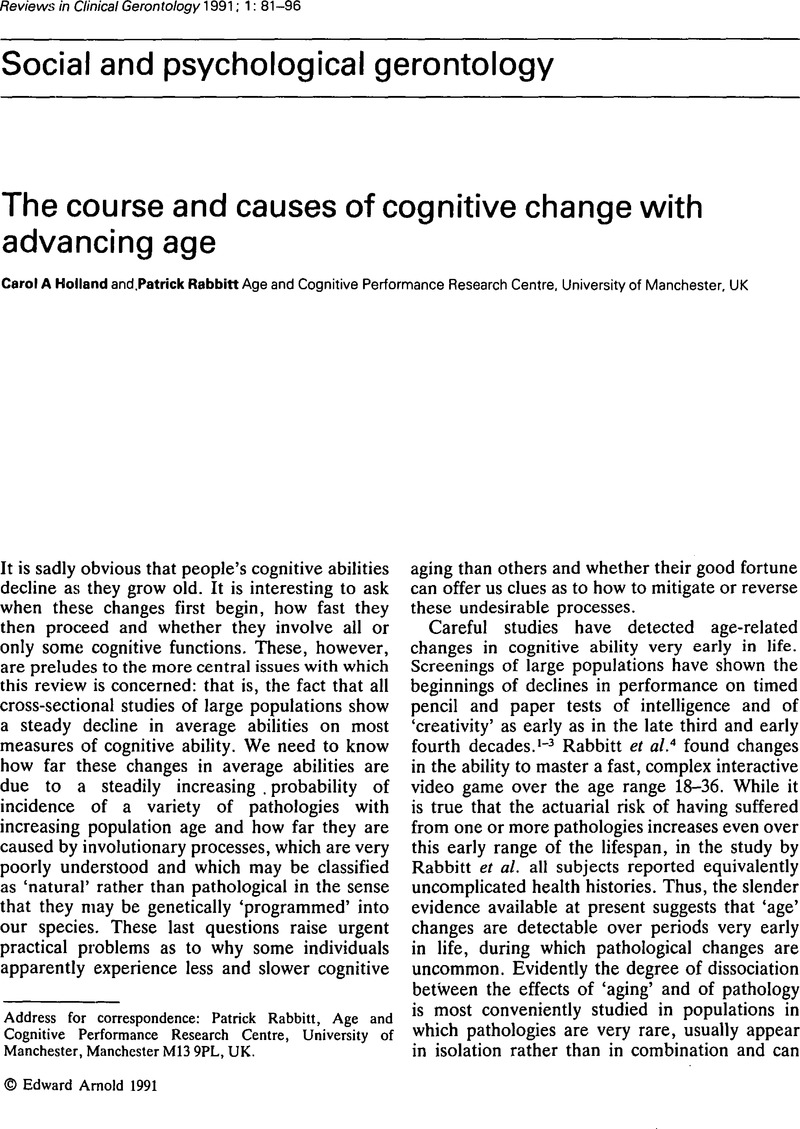Crossref Citations
This article has been cited by the following publications. This list is generated based on data provided by
Crossref.
Huppert, Felicia A
1991.
Neuropsychological assessment of dementia.
Reviews in Clinical Gerontology,
Vol. 1,
Issue. 2,
p.
159.
RABBITT, PATRICK
1991.
Management of the working population.
Ergonomics,
Vol. 34,
Issue. 6,
p.
775.
Nettelbeck, Ted
and
Rabbitt, Patrick M.A.
1992.
Aging, cognitive performance, and mental speed.
Intelligence,
Vol. 16,
Issue. 2,
p.
189.
Brayne, Carol
1993.
Clinicopathological Studies of the Dementias from an Epidemiological Viewpoint.
British Journal of Psychiatry,
Vol. 162,
Issue. 4,
p.
439.
Brayne, C.
1993.
Research and Alzheimer's disease: an epidemiological perspective.
Psychological Medicine,
Vol. 23,
Issue. 2,
p.
287.
Haigh, Ruth
1993.
The ageing process: a challenge for design.
Applied Ergonomics,
Vol. 24,
Issue. 1,
p.
9.
Rabbitt, Patrick
1993.
Does it All Go Together When it Goes? The Nineteenth Bartlett Memorial Lecture.
The Quarterly Journal of Experimental Psychology Section A,
Vol. 46,
Issue. 3,
p.
385.
O'neill, D.
1993.
The ageing process.
Baillière's Clinical Anaesthesiology,
Vol. 7,
Issue. 1,
p.
17.
Craig, Ian
and
Tallis, Raymond
1994.
Impact of Valproate and Phenytoin on Cognitive Function in Elderly Patients: Results of a Single‐Blind Randomized Comparative Study.
Epilepsia,
Vol. 35,
Issue. 2,
p.
381.
Maria, Carolien Hendrika Smits
van Rijsselt, René Johannes Theresia
Jonker, Cees
and
Deeg, Dorly Joan Hardy
1995.
Social participation and cognitive functioning in older adults.
International Journal of Geriatric Psychiatry,
Vol. 10,
Issue. 4,
p.
325.
Gomm, Roger
1996.
Mental Health Matters: A Reader.
p.
110.
Twining, Charles
1996.
Rehabilitation of Older People.
p.
54.
Rabbitt, Patrick
Bent, Nuala
and
Mclnnes, Lynn
1997.
Health, age and mental ability.
The Irish Journal of Psychology,
Vol. 18,
Issue. 1,
p.
104.
Elwood, P. C.
Gallacher, J. E.
Hopkinson, C. A.
Pickering, J.
Rabbitt, P.
Stollery, B.
Brayne, C.
Huppert, F. A.
and
Bayer, A.
1999.
Smoking, drinking, and other life style factors and cognitive function in men in the Caerphilly cohort.
Journal of Epidemiology & Community Health,
Vol. 53,
Issue. 1,
p.
9.
Jelicic, Marko
Jonker, Cees
and
Deeg, Dorly J. H.
2001.
Effect of Low Levels of Serum Vitamin B12 and Folic Acid on Cognitive Performance in Old Age: A Population-Based Study.
Developmental Neuropsychology,
Vol. 20,
Issue. 3,
p.
565.
Rabbitt, Patrick
2002.
Stevens' Handbook of Experimental Psychology.
Rabbitt, Patrick
Watson, Peter
Donlan, Chris
Mc Innes, Lynn
Horan, Michael
Pendleton, Neil
and
Clague, John
2002.
Effects of death within 11 years on cognitive performance in old age..
Psychology and Aging,
Vol. 17,
Issue. 3,
p.
468.
Singh‐Manoux, Archana
Britton, Annie R.
and
Marmot, Michael
2003.
Vascular Disease and Cognitive Function: Evidence from the Whitehall II Study.
Journal of the American Geriatrics Society,
Vol. 51,
Issue. 10,
p.
1445.
Rabbitt, P.
Lunn, M.
and
Wong, D.
2005.
Neglect of Dropout Underestimates Effects of Death in Longitudinal Studies.
The Journals of Gerontology Series B: Psychological Sciences and Social Sciences,
Vol. 60,
Issue. 2,
p.
P106.
Woods, Bob
2005.
The Cambridge Handbook of Age and Ageing.
p.
252.



